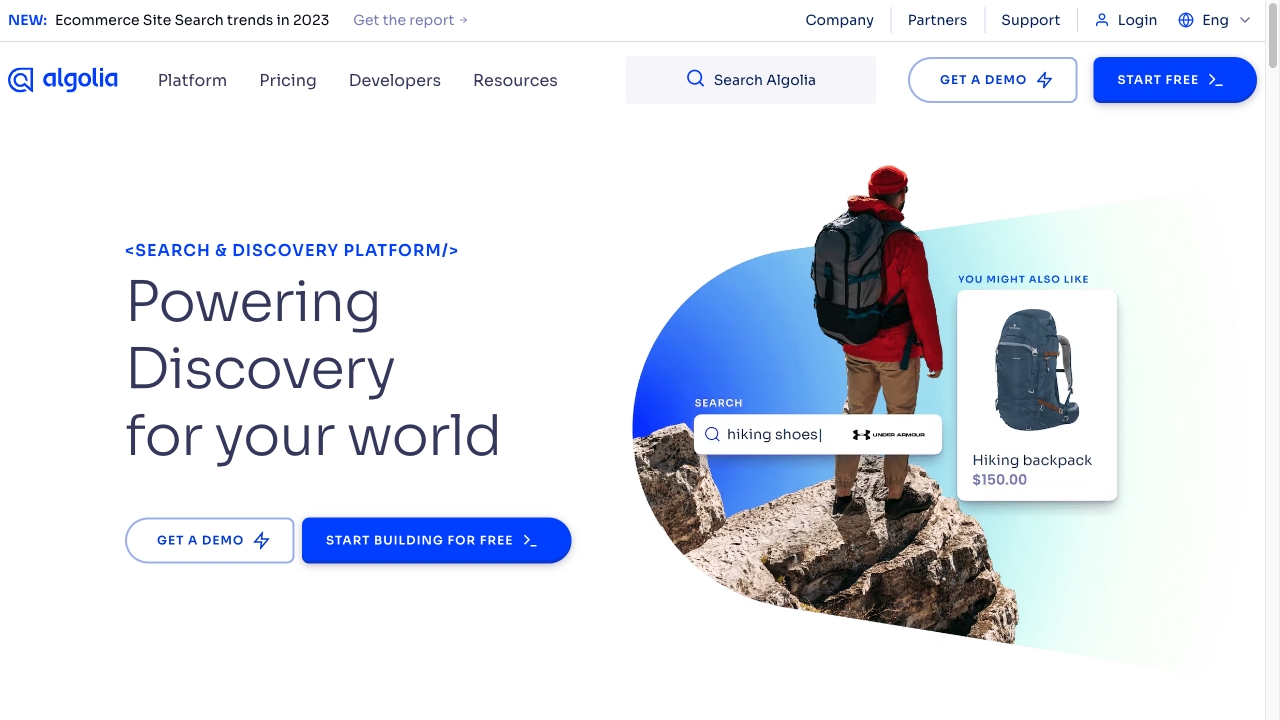
Algolia
Open Website-
Tool Introduction:AI search and recommendations for apps and ecommerce, fast and scalable.
-
Inclusion Date:Oct 21, 2025
-
Social Media & Email:
Tool Information
What is Algolia AI
Algolia AI is a Search and Discovery platform that powers fast, relevant experiences across websites and apps. It blends neural semantic search with classic keyword matching to surface precise results, robust autocomplete, and personalized recommendations. With services like NeuralSearch, Keyword Search, and Recommend, it scales from startups to enterprise traffic across ecommerce, marketplaces, media, and SaaS. Flexible APIs, SDKs, and UI components let teams index content, tune relevance, and deliver performant site search and product discovery quickly.
Algolia AI main features
- NeuralSearch (semantic + keyword): Combines vector-based semantic understanding with lexical matching for high relevance on both natural language and exact queries.
- Keyword Search: Battle-tested relevance with typo tolerance, synonyms, rules, facets, and filters for precise control.
- Recommend: AI-powered product and content recommendations (related items, frequently bought together, trending).
- Autocomplete & Query Suggestions: Instant suggestions and federated search for faster discovery.
- Re-ranking & Personalization: Contextual re-ranking using signals and user behavior to improve conversion.
- Merchandising & Rules: Pin, boost, bury, and rule-based strategies to align results with business goals.
- Analytics & A/B Testing: Query insights, click/conversion tracking, and experiments to validate relevance changes.
- Faceting & Navigation: Fast faceted filtering for catalogs and content libraries.
- APIs, SDKs, and UI Kits: Client libraries and ready-made components for web, mobile, and headless architectures.
- Scalability & Performance: Low-latency search with high availability for global traffic.
- Security & Governance: API keys, ACLs, and index-level controls to protect data access.
Who is Algolia AI for
Algolia AI suits product teams, developers, and data practitioners building site search, in-app search, and recommendation engines. it's ideal for B2C/B2B ecommerce catalogs, marketplaces with multi-seller inventories, media libraries, documentation portals, and SaaS applications that need reliable, scalable discovery with fine-grained relevance control.
How to use Algolia AI
- Model your data: Define records, attributes, and facets to index (e.g., titles, descriptions, categories, prices).
- Create an index: Set up indices for products, articles, or users via dashboard or API.
- Ingest content: Push data with APIs/SDKs or connectors; keep indices fresh with incremental updates.
- Configure relevance: Choose searchable attributes, ranking, typo tolerance, synonyms, and business rules.
- Enable NeuralSearch or Keyword Search: Select the approach or hybrid settings based on your use case.
- Implement UI: Add autocomplete, search results, and facets using UI libraries or custom components.
- Activate Recommend: Configure recommendation models and placement; instrument click and conversion events.
- Measure & iterate: Use analytics and A/B tests to refine relevance, merchandising, and performance.
Algolia AI industry use cases
In B2C ecommerce, retailers deploy NeuralSearch to interpret natural language queries and boost catalog discovery, while Recommend drives cross-sell with “frequently bought together.” B2B distributors layer precise filters and access control for complex specs. Marketplaces use federated search across sellers and categories. Media platforms enable fast faceted search over large content libraries. SaaS products add in-app search to surface docs, tickets, and settings instantly.
Algolia AI pricing
Algolia typically offers tiered, usage-based pricing that scales with indexed records, search operations, and enabled features such as Recommend or advanced relevance options. Plans and entitlements vary by need, with self-serve and enterprise options. Free tiers or trials may be available; consult the official pricing page for the most current details and limits.
Algolia AI pros and cons
Pros:
- Fast, scalable search with low latency for global traffic.
- Hybrid semantic and keyword search for robust relevance.
- Rich ecosystem of APIs, SDKs, and UI components.
- Strong merchandising, rules, and analytics for business control.
- Versatile across ecommerce, marketplaces, media, and SaaS.
Cons:
- Costs can rise with very large catalogs or high query volume.
- Effective relevance tuning may require expertise and iteration.
- Data modeling and instrumentation (events, conversions) add setup effort.
- Some advanced capabilities are tied to specific plan tiers.
Algolia AI FAQs
-
Q1: What is the difference between NeuralSearch and Keyword Search?
NeuralSearch uses semantic understanding (vector-based) to grasp intent in natural language, while Keyword Search focuses on lexical matching. Many teams use a hybrid setup to balance precision and recall.
-
Q2: Does Algolia AI support personalization and re-ranking?
Yes. You can apply behavioral signals and business rules to re-rank results, and use Recommend to personalize suggestions by context.
-
Q3: How do I integrate Algolia into my app?
Use the REST API or official SDKs to create indices and push records, then implement UI components for autocomplete, results, and facets. Configure relevance and track events to optimize.
-
Q4: Can it handle multilingual search?
Yes. Configure language-specific settings, tokenization, and synonyms per index to improve relevance for multiple locales.
-
Q5: What data is needed for Recommend?
Provide product or content catalogs plus interaction events (views, clicks, add-to-cart, purchases) to generate high-quality recommendations.
-
Q6: How do I measure search performance?
Use built-in analytics for query volume, no-result rates, click-through, and conversion metrics, and run A/B tests to validate changes safely.




